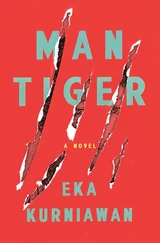Meanwhile, in the cemetery, Kamino and Farida passed their quiet life together full of joy. Kamino, happy that he had finally found a girl willing to be a gravedigger’s wife, didn’t even mind when she told him repeatedly that the only reason she’d married him was because he lived close to her father’s grave.
“It’s pointless to be jealous of a dead man,” said Kamino.
They still often played that jailangkung game, calling up Mualimin’s spirit. The dead man seemed happy that Farida had landed a gravedigger husband.
“There’s no one kinder than gravediggers,” said the dead man. “They graciously serve people who no longer need to be served.”
Their marriage grew even happier when Farida got pregnant. “If it’s a boy, then the next generation of gravediggers will have arrived,” said Farida to her husband, “but if it turns out to be a girl, then this city might not have anyone to bury their dead.”
That was their life together. They passed the time talking mostly to each other, and to the spirits of the dead, and occasionally talking with mourners accompanying the corpses, and they also enjoyed rare opportunities to visit their neighbors across the cocoa and coconut plantations.
Their life could be considered prosperous. They had the house the city had given them, and their family was never short on money because almost every day there were mourners who each slipped one or two bills into Kamino’s hand. People made a pilgrimage to the grave on the seventh day after someone’s death, and another pilgrimage on the fortieth day, and again on the one hundredth day, and then another on the thousandth day. Early in the fasting month of Ramadan they made a pilgrimage, and after Eid sometimes people made another pilgrimage too. Because so many people were buried in the cemetery, it wasn’t surprising if every day someone came there on a pilgrimage, and Farida and Kamino enjoyed the entertainment of all those visitors.
The only slightly bothersome thing were all the disturbances from the ghosts. They weren’t evil, but they were mischievous. They often teased people forced to walk past the cemetery, making spooky noises or appearing as headless sweet potato sellers. Everyone avoided the place at night but Kamino and Farida were quite used to the ghosts, and simply chased them away like other people shoo out a chicken that has wandered into the kitchen. Every once in a while the couple even teased the ghosts right back.
At midday, if there wasn’t much to be done, Farida still often sat alone beside her father’s grave. She had put a chair there, but once her pregnancy was farther along sitting became tiring, so she rolled out a woven mat and lay down under the shade of the frangipani leaves, but the sea breeze would set the sand flying along the ground. Kamino made her a rope hammock that he tied from one frangipani tree to the other so his wife could lie there lulled by the wind, closing her eyes with her body swaying gently.
But one day this led to disaster. When her pregnancy had reached six months, Farina fell asleep in that hammock and had a terrifying nightmare. In shock, she startled awake and bounced up out of the hammock and fell to the ground. She hemorrhaged, and before Kamino, who had heard her body thud onto the dirt, could reach her, she was dead.
How sad that man was: he had lost both his wife and his unborn child. He would now return to the same loneliness that he’d endured for so many years, except this new loneliness would be much more depressing, because now he had tasted happiness.
He took care of his wife’s burial himself, only telling one or two neighbors what had happened, too overwhelmed to tell anybody else. He lovingly bathed his wife’s body, lacerated by grief, and blaming himself for that hammock. He prayed over her body himself, and since his house was well stocked with burial shrouds, he even wrapped his wife’s body in her shroud himself. In the afternoon he began to dig his wife’s grave, right beside Mualimin’s grave, because he knew that was exactly what Farina would have wanted. When night fell, the digging was finished. With tears streaming down his face, he carried his wife’s corpse and placed it in the small recess at the bottom of the pit. He covered it with small planks of wood. As he began to fill in the hole with dirt, his sobs broke out into wrenching convulsions.
He didn’t sleep that night. Like Farida had done when she was grieving the death of her father, Kamino just sat next to the grave of his wife without moving a muscle. His body was still stained with earth from her grave and the shovel still stood at his side. Suddenly he heard small whimpers. They were the cries of a child — no, a baby. He looked this way and that, but he saw no one. He began to think that maybe it was some cemetery ghosts making mischief, but as those cries became louder and more distinct, he knew that they were coming from his wife’s grave.
Like a man possessed, he dug up his wife’s burial plot. He pulled out the protective wooden planks. The corpse was still lying stiffly covered in the burial shroud, but near its crotch he saw something moving. Kamino quickly unwrapped the shroud, and saw a half-emerged baby, pinched by the corpse’s two thighs. He pulled on the baby, who was clearly very much alive and crying loudly, and cut the umbilical cord with a bite.
That was his son. Born in a grave, premature, but seemingly quite healthy. The little one was a blessing in Kamino’s time of sorrow, like a love token sent from his sweetheart. He raised that child himself, doted on him, and gave him the name Kinkin.
On the morning of the day he was supposed to be put to death, Comrade Kliwon was found battered and bruised in the field behind the military headquarters by Adinda, who had come to find out whether he was dead. As Adinda had hoped he would be, he was wearing the clean and proper clothes that she had sent for him (though now they were decorated with blood splatters), because at half-past four that morning he had calmly bathed, and then had sized himself up in front of a mirror, hoping that the angel of death would like how he looked.
“Are you afraid, Comrade?” asked one of the guards a moment before the time for his execution arrived.
“It’s only soldiers who are filled with fear,” said Comrade Kliwon. “If they weren’t, they wouldn’t need any weapons.”
At the stroke of five o’clock a group of soldiers came to get him, soldiers who were pissed off because their mission to shoot him dead had been canceled at Shodancho’s orders. And their anger boiled all the hotter to see the man’s calm demeanor in facing death.
“I can walk to my grave by myself,” said Comrade Kliwon.
“Please permit us to go through the trouble of taking you there,” they answered, hauling him across the floor with his legs dragging outstretched behind. The soldiers kicked him as they pulled him down the corridor, without giving him the chance to utter even one word in protest. Then they threw him in the middle of the small field where he was supposed to have been executed and a spotlight illuminated the grass, which made Comrade Kliwon, who was trying to get up, blink. His body hurt everywhere from being kicked the whole way. Even facing death, he still hoped that he had no broken bones.
He stood, feeling blood dripping down his back as he walked, staggering a little toward the wall where he would have to stand to be shot. But those soldiers hit him with ferocious and practiced blows, kicked him again with their boots, and struck him with the butts of their rifles.
“You will never kill me this way,” said Comrade Kliwon.
One more kick and he lost consciousness. That stopped all the torture. The soldiers just rolled him over with the toes of their boots. No one dared hit him again in his unconscious state, afraid that he would die. Shodancho had permitted them to torture him, but not to kill him, and so they dragged his unconscious body to a yard outside headquarters. If he died torn to shreds by dogs, that wasn’t their responsibility.
Читать дальше











